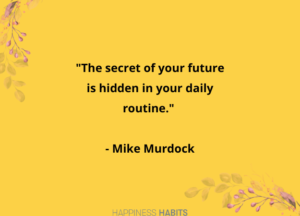As we navigate the complex world, we develop several habits from childhood through adulthood. Whether it is brushing teeth morning and night or sleeping on a particular side of the bed in a particular position, human beings are creatures of habit. Habits and routines are an integral and inextricable part of our daily lives. While both involve behaviors and repetition, most of us use these words interchangeably. But habits and routines are distinctly different. Habits can be good or bad. Waking up before sunrise is a good habit, while chronic smoking isn’t. Routines are plain good; for toddlers and adults alike. They encourage healthy habits, help us stay productive, organized, and contribute to our overall (mental, physical, and emotional) well-being. Over the past couple of years, there’s been a swelling interest in the science of habits and routines, especially given the stressful times humanity has been through. What is the difference between habits and routines, and why are they so important? Let’s break it down.
What is a habit?
Habits are “something that you do often and regularly, sometimes without knowing that you are doing it,” as defined by the Cambridge Dictionary.
Studies reveal that an astonishing 43% of our daily actions are habitual, meaning we spend a good part of our day doing things on autopilot! Ever found yourself driving to the office when you wanted to go someplace else? Well, you take the same route to the office each day, so it’s something your subconscious mind is prone to do without much thought.
Habits are automatically triggered in response to cues and established through repetition. For example, waking up is a cue to brush your teeth. Stress can be a trigger for smoking. The stronger the repetition of action in response to the cue, the more ingrained the habit. Habits, good or bad, are learned, which means they can be unlearned too.
If you’re trying to add in a new habit or break an old one, then here’s how you can Rewire and Reprogram through Pattern Interrupt.
What is a routine?
A routine is defined as “a usual or fixed way of doing things.”
For example, if your goal is good health and a certain level of fitness, you will set up a routine to achieve that goal. That routine could look like waking up early, brushing your teeth, hydrating, and going to the gym/working out before heading to the shower. Waking up early and working out or going to the gym may not be habitual, but you consciously do it every day, and that becomes your morning routine. It is a deliberate practice that requires effort, not something you do on autopilot.
Routines encourage healthy habits, make achieving goals easier, are calming during stressful times, and help carve out time to pursue things that matter. It’s no wonder then, that the famous and successful swear by the life-changing benefits of daily routines.
Related read: Here’s how you can leverage the power of habit stacking to create sustainable routines in life.

The Difference lies in…
Awareness: While habits are from a subconscious state, routines come from a place of awareness and intention. Only if you set the intention can you accomplish and establish routines.
Effort: Habits are automatic. Routines require deliberate practice and intentional repetition. Only conscious efforts can make it a consistent process.
For example, everyone is aware of habits for a healthy life. If routines were as automatic and effortless as habits and we could do them on autopilot, the world would be full of healthy people. Think about it!
Motivation: Routines do not stem from impulses and require motivation, while habits don’t. Without motivation, routines can quickly fall apart.
Comfort: Routines are easier to abandon or break because they require effort. Breaking routines doesn’t feel uncomfortable. For example, having cheat days and days off from eating healthy and workout routines is easy. But habits are effortless and hard to break. And that’s the reason getting rid of bad habits is so challenging. Breaking habits feels terribly uncomfortable. Imagine not washing your hands before and after a meal.
If you want to be a part of a community that thrives on helping each other build habits for lasting happiness, join my Facebook Group here.
Unleash the power of Habits and Routines
In today’s fast-paced, stressful times, positive habits and routines keep us sane and help us thrive. They are powerful tools that help boost productivity, unleash creativity, build successful careers, achieve our life goals, and ultimately reward us with a happy life.
Utilize the power of habits and routines to engineer your future and become the best version of yourself. Change isn’t easy, but with dedication, determination, discipline, and a little help from your happiness coach, you can design your perfect happy life.